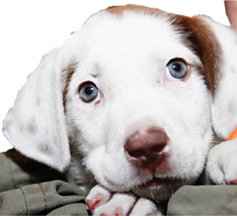Dogs are capable of loving their owners
Scientists found that
domesticated animals release the ‘love hormone’ oxytocin in intimate
situations
They have long been known as man’s best friend: loyal companions that
adore their owners.
But it’s not just an act to make sure they get fed - dogs really are
capable of love, research has shown. Scientists found that domesticated
animals release oxytocin in intimate situations.
|

Scientists found that the bond between people and their pets
may work both ways |
Known as the “love hormone”, it is the same chemical used to create
close bonds between humans. Prof Paul Zak and his lab carried out a
number of experiments to measure the levels of oxytocin released when
pets interacted with both other animals and humans.
Zak travelled to an animal refugee in Arkansas where different
species interact with one another regularly. While there, Zak obtained
blood samples from a domestic mixed-breed terrier and a goat that often
played together.
Their play involved “chasing each other, jumping towards each other,
and engaging in simulated fighting (baring teeth and snarling)”. The two
young males were placed together in an enclosure where they engaged in
play for 15 minutes, after which another blood sample was taken.
“We found that the dog had a 48 percent increase in oxytocin. This
shows that the dog was quite attached to the goat. The moderate change
in oxytocin suggests the dog viewed the goat as a ‘friend’,” Zak said.
“More striking was the goat's reaction to the dog: It had a 210 percent
increase in oxytocin.
At that level of increase, within the framework of oxytocin as the
‘love hormone’, we essentially found that the goat might have been in
love with the dog.” He said: “The only time I have seen such a surge in
oxytocin in humans is when someone sees their loved one, is romantically
attracted to someone, or is shown an enormous kindness.”
Zak said that the results suggested that pets may feel love for their
owners. He said: “That animals of different species induce oxytocin
release in each other suggests that they, like us, may be capable of
love.
It is quite possible that Fido and Boots may feel the same way about
you as you do about them. You can even call it love.”
And it works the other way around too. Owners that love their pets
experience a surge in oxytocin when spending time with their favourite
pooch or moggy - but not everyone is a pet person.
In another experiment the researchers obtained blood samples from 100
participants, who then went into a private room and played with a dog or
cat for 15 minutes.
Following this, a second blood sample was taken and levels of
oxytocin were measured.
The results showed that only 30 percent of the participants
experienced increased levels of oxytocin after interacting with the
animals.
Zak said that people who had owned dogs in the past were more likely
to feel a bond while playing with the animals than those who had owned
cats, or those who had never owned pets at all.
He said: “Dogs are simply more ‘people-oriented’ than cats, and
previous pet ownership seems to have trained our brains to bond with
them.”
- The Independent |

